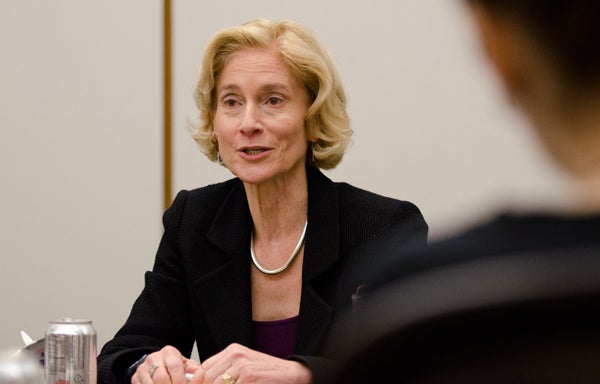|
February 10, 2012
Not for profit: Why democracy needs the humanities
Author and philosopher Martha Nussbaum says a declining emphasis on the study of the humanities could lead to a world of "useful profit makers with no imaginations." By Corrie Goldman

During her visit to Stanford, Professor Nussbaum took part in a workshop with postdoctoral scholars from the Center for Ethics in Society. (Photo: Linda A. Cicero / Stanford News Service) From the United States to India and the United Kingdom, humanities and arts programs are being cut at all levels of education. This trend, says the University of Chicago's Martha Nussbaum, has the potential to create a generation of citizens who are ill equipped to participate in a democratic society.
Nussbaum is a professor of law and ethics with appointments in philosophy, classics and political science.
While speaking recently to an audience at Stanford's Cubberley Auditorium, Nussbaum, author of Not For Profit: Why Democracy Needs the Humanities, warned that education leaders are being shortsighted in their efforts to stay economically competitive.
Increasingly viewed as "useless" by politicians, humanities and arts programming is being replaced by technical training courses in sciences, engineering and technology in the name of economic gain. While technical skills are important for the future health of nations, Nussbaum said that they alone do not make for a fully educated student. Without people with a liberal arts background, she said, the world would be filled with "narrow, technically trained workers, rather than complete citizens who can think for themselves, criticize tradition and authority, and understand the significance of another person's sufferings and achievements."
These so-called soft-skills are essential for developing a "decent world culture" and maintaining healthy democracies, she said. Study of history and culture imparts the ability to approach global issues as a citizen of the world. Study of philosophy teaches the critical thinking skills that help us reason about our choices. Participation in the creative arts fosters an empathetic capacity and, Nussbaum said, "allows us to imagine the challenges facing someone unlike ourselves."
Nussbaum's presentation was sponsored by the Bowen H. McCoy Family Center for Ethics in Society at Stanford. In opening remarks, center Director Debra Satz said that the time to evaluate the role of humanities in the curriculum is now, when a tsunami of change is headed toward education in the form of online learning. Satz, a professor of philosophy and the senior associate dean for the humanities and arts at Stanford, later added that Nussbaum's comments "underscore the importance of the humanities in supporting a democratic culture and society. The humanities are not frills, but call on and develop the critical skills we need to live in a diverse and complex world."
Preparing students for political engagement
Many business and political pundits espouse an education-for-economic-growth model, in which all gains are measured financially, Nussbaum said. In the trickle-down model, education is targeted toward increases in gross domestic product, with the expectation that all facets of a society will benefit. However, Nussbaum said, "Empirical evidence does not show that correlation." She cited as examples several states in India that focused economic development efforts on technical workers. Although there was genuine economic improvement for the few elite workers, other residents remained illiterate and without improved access to education.
Nussbaum outlined an alternative to development efforts focused on economics: Called the "human development paradigm," or HDP, the new model of education is gaining traction in a number of countries. Issued by the United Nations Development Program, the HDP model emphasizes fundamental opportunities that each person should have in areas of life and health, political participation and education. Citizens would need certain skills learned from a humanities education to attain the "threshold level of opportunity" defined by HDP. Those skills include the ability to deliberate about political issues and the ability to reflect, argue, debate and think of the nation as a whole and as part of a larger world order.
Learning to question authority
Nussbaum quoted Socrates, who argued that democracy needs citizens who can think for themselves and reason together about their choices rather than just deferring to authority. Young people, Nussbaum said, will have a hope of holding politicians accountable only if they know how to think critically about what they hear, "testing its logic and imagining alternatives to it."
Accountability is a rising trend in the global business culture. Employees are encouraged to come forward with questions, ideas and problems. Nussbaum said that the discussion-and-debate format found in humanities classrooms builds the confidence required to be a whistle-blower or innovator.
Speaking about the Chicago Children's Choir for low-income youth in her hometown, Nussbaum described how participation in the arts sparks curiosity for the unfamiliar. "By learning to sing music from another time and place the children learn about their role in their community and in the world, " she said.
In closing, Nussbaum reiterated that the arts and humanities not only "shape people who are able to see other human beings as full people with thoughts and feelings" but also build "nations that are able to overcome fear and suspicion in favor of sympathetic and well-reasoned debate."
An audio excerpt of Nussbaum's talk is available on the Center for Ethics in Society website.
Corrie Goldman is the humanities outreach officer at Stanford.
-30-
|